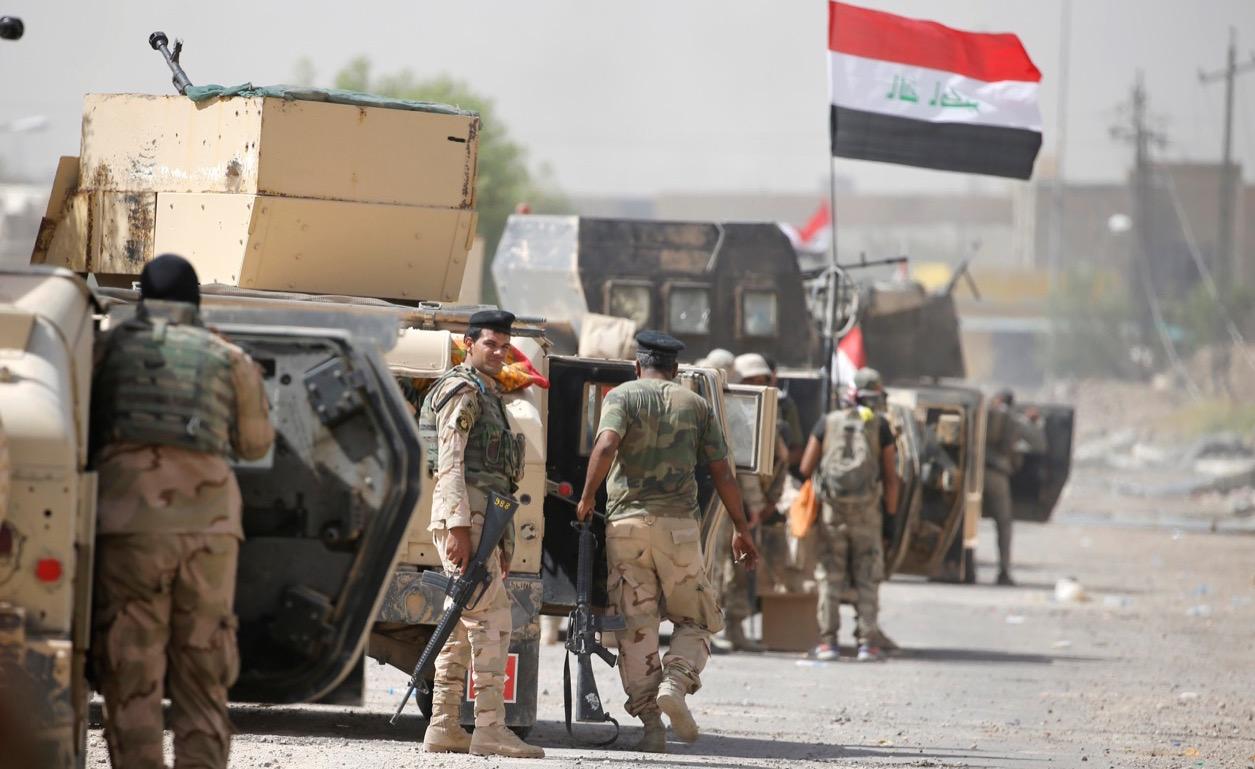Iraqi forces say they are taking back Fallujah, with ‘little resistance’ from ISIS
Iraqi army soldiers carry their weapons and the national flag in the center of Fallujah on June 17.
Iraqi forces raised the national flag over the main government compound in Fallujah on Friday, top commanders said, a breakthrough in the nearly 4-week-old offensive against the Islamic State group's bastion.
They met limited resistance from ISIS fighters, who were fleeing the city, the commanders told AFP, leaving the organization on the brink of losing one of the most emblematic strongholds in its 2-year-old "caliphate."
It is the latest setback for the jihadists who have also lost territory in neighboring Syria and in Libya in recent weeks, although US Central Intelligence Agency director John Brennan warned on Thursday that they remain a formidable force with global reach.
"The counter-terrorism service and the rapid response forces have retaken the government compound in the center of Fallujah," the operation's overall commander, Lieutenant General Abdulwahab al-Saadi, told AFP.
Raed Shaker Jawdat, Iraq's federal police chief, confirmed the advance.
"The liberation of the government compound, which is the main landmark in the city, symbolizes the restoration of the state's authority" in Fallujah, he said.
Saadi said the Iraqi flag was raised above government buildings in the compound and claimed that "Iraqi forces have now liberated 70 percent of the city."
In the deserted, recently reconquered neighborhoods of the insurgent bastion known in Iraq as the "City of Mosques," elite forces were consolidating positions, stocking up on food and weapons.
Dozens of bodies of dead ISIS fighters were left to rot under blankets amid the rubble of homes destroyed by airstrikes, rockets or controlled explosions of the hundreds of bombs the jihadists themselves laid across the city.
'Little resistance'
The government lost control of Fallujah in 2014, months before ISIS took second city Mosul and swept across large parts of the country.
Fallujah, which lies just 30 miles west of Baghdad, is one of ISIS' key historical bastions and its loss would leave Mosul as the only major Iraqi city under its control.
The US-led coalition, which has carried out airstrikes in support of the Fallujah operation, had initially favored focusing efforts on recapturing Mosul.
Prime Minister Haider al-Abadi, who was facing huge political pressure over the reform of his own government when he declared the launch of the Fallujah operation, has vowed to defeat ISIS nationwide by the end of the year.
In the hours running up to the latest push into the heart of Fallujah, Iraqi forces retook several neighborhoods in quick succession.
"This operation was done with little resistance from Daesh," Saadi said, using an Arabic acronym for ISIS.
After months of military operations aimed at completely sealing off the city, ISIS had been expected to fight to the death in a protracted suicide holdout but recent developments suggest the siege was porous.
"There is a mass flight of Daesh to the west that explains this lack of resistance. There are only pockets of them left and we are hunting them down," Saadi said.
Security officials said many ISIS members had managed to slip out of the city by blending in with fleeing civilians in recent days, in some cases paying off security forces.
"The top leaders are mostly gone and those left behind to defend the city are not their best fighters, which explains their performance," said a security officer speaking on condition of anonymity.
Tens of thousands of civilians have been forced from their homes since the start of the operation last month.
Aid groups overwhelmed
The first to escape ISIS rule were those living in rural outlying areas, in the early phase of the operation which saw a myriad different Iraqi forces seal the siege of the city.
Residents of the city centre had been trapped in dire conditions for days but recent advances have allowed large numbers to escape.
The Norwegian Refugee Council, which runs camps for the displaced near Fallujah, said the sudden influx meant relief was drying up fast.
"Thousands of civilians from Fallujah are right now heading towards displacement camps in a dramatic development that is overwhelming emergency aid provision and services," it said.
With ISIS on the retreat in the city, a window has opened for civilians to leave but the journey remains dangerous, with several cases of fleeing civilians killed or wounded by the explosion of roadside bombs.
There were an estimated 50,000 people in the city when the operation was launched but it is unclear how many remain now.
Civilians have been used as human shields by ISIS and those who managed to flee face the risk of sectarian-motivated abuse by elements of the pro-government forces.
Fallujah is a Sunni Muslim city and the involvement of Shiite militia groups in the operation had raised fears of sectarian revenge attacks.
By AFP's Salam Faraj and Jean-Marc Mojon.
We want to hear your feedback so we can keep improving our website, theworld.org. Please fill out this quick survey and let us know your thoughts (your answers will be anonymous). Thanks for your time!
